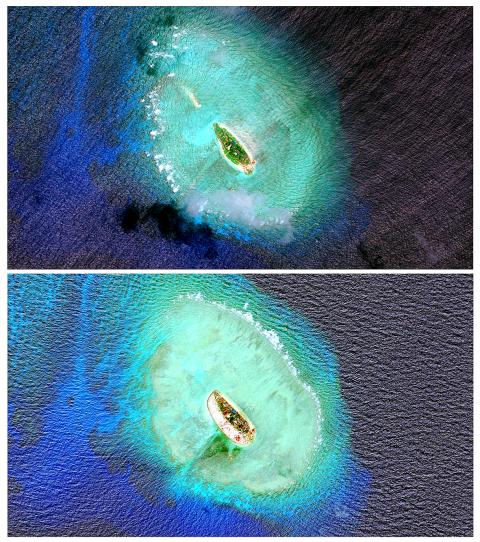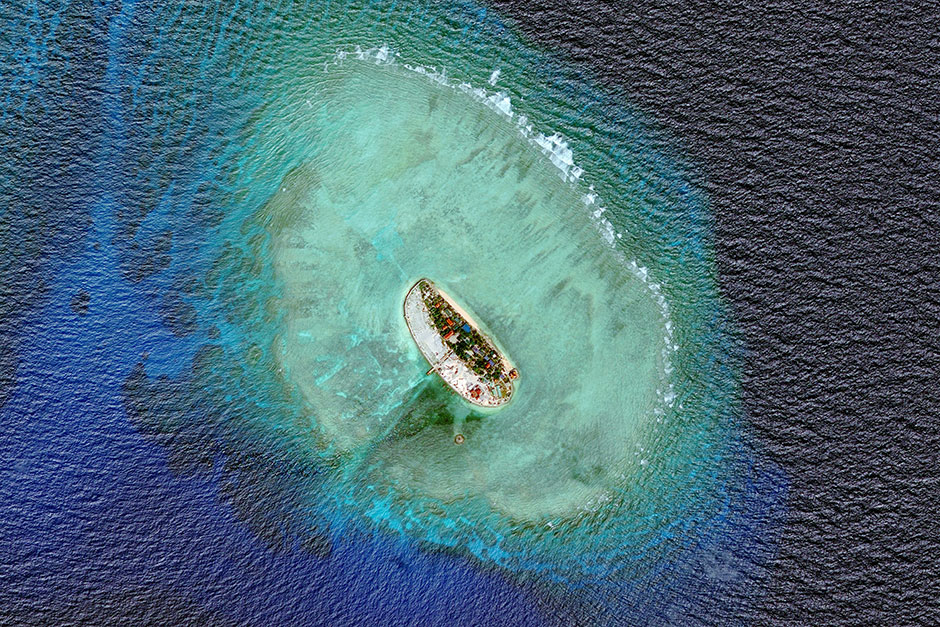Vietnamese reclamation, any media care to report it?
Finally someone did! A rare English language general news article with some details on what at least one other SCS claimant country has been doing in terms of reclamation. There should be more reporting on work done by others as well.
World | Fri May 8, 2015 9:38am EDT Related: WORLD, CHINA
Images show Vietnam's South China Sea reclamation, China defends own
WASHINGTON/BEIJING | BY DAVID BRUNNSTROM AND BEN BLANCHARD
Newly released images show Vietnam has carried out significant land reclamation at two sites in the disputed South China Sea, though the scale and pace is dwarfed by that of China, a U.S. research institute said.
In response, China condemned Vietnam's actions, and said its work in the region was part of an obligation to the international community to improve navigation safety and contribute to science and research, including building observation platforms to monitor sea levels.
The photographs, shared with Reuters by Washington's Center for Strategic and International Studies (CSIS), show an expansion of the land area of Vietnamese-controlled Sand Cay and West London Reef in the Spratly archipelago and the addition of buildings.
Mira Rapp-Hooper, director of CSIS's Asia MaritimeTransparency Initiative (amti.csis.org/), said the work included military installations and appeared to have started before China began a flurry of reclamation projects last year.
The photographs, taken by satellite imagery firm DigitalGlobe, were taken between 2010 and April 30 this year.
"On one site, it has constructed a significant new area that was formerly under water and at another it has used land reclamation to add acreage to an existing island," Rapp-Hooper said.
Vietnam's government did not immediately respond to a request for comment, but routinely says it has sufficient legal and historical evidence to support its claims in the Spratlys.
Chinese Foreign Ministry spokeswoman Hua Chunying said that Vietnam, the Philippines and other countries had been carrying out such reclamations for a long time on what she said were Chinese islands being illegally occupied.
"We demand that the relevant countries stop all their activities which infringe upon China's sovereignty and rights," she told a daily news briefing.
INTERNATIONAL OBLIGATIONS
Hua added that China's building work was partly to better fulfill its international obligations, including as part of a deal agreed at a UNESCO meeting in Paris in 1987.
There, she said, China was entrusted to build five out of 200 sea level observation platforms, including on the Spratlys.
"The scale of China's construction should be commensurate with its responsibilities and obligations as a major country," Hua added.
The speed of recent Chinese reclamation work has alarmed its neighbors and the United States, which sees it as a potential threat to the status quo in a region through which $5 trillion of sea-borne trade passes each year.
China claims 90 percent of the potentially energy-rich South China Sea, with overlapping claims from Brunei, Malaysia, the Philippines, Vietnam and Taiwan.
New Vietnamese military facilities at Sand Cay appeared to include defensive positions and gun emplacements, and new buildings visible on West London Reef could also have military applications, Rapp-Hooper said.
"Strictly speaking, these photos show that China is right,"Rapp-Hooper said, "but we can safely say that the scope and scale of what China has undertaken is totally unprecedented and dwarfs Vietnam's activities many times over."
She said the images showed that Vietnam had reclaimed about 65,000 square meters (699,654 square feet) of land at WestLondon Reef and 21,000 square meters (226,042 square feet) at Sand Cay. This compared to 900,000 square meters (9.6 million square feet) reclaimed by China at a single reef, Fiery Cross.
Rapp-Hooper said satellite images showed that since about March 2014, China had conducted reclamation work at seven sites in the Spratlys and was constructing a military-sized air strip on one artificial island and possibly a second on another.
She said Vietnam already had an airstrip on the Spratlys.
The U.S. State Department and Pentagon had no immediate comment on the latest images.
U.S. President Barack Obama last month accused China of "flexing its muscles" to advance its maritime claims.
The Philippines has been the most vocal critic in Asia of China's reclamation work, but was unlikely to be troubled by Vietnam's activities partly because of growing security ties between Manila and Hanoi, experts said.
"For the Philippines, Vietnam's reclamation activities are not threatening because they are only small scale compared to China, which is very large scale," said Rommel Banlaoi, a Philippine security expert.
(Additional reporting by Manuel Mogato in Manila and Martin Petty in Hanoi; Editing by Warren Strobel, Stuart Grudgings, Dean Yates and Mike Collett-White)




